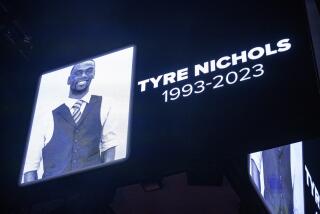Jury Selection Begins in King Beating Case : Courts: All of the first 12 racially mixed panelists called for questioning said they had seen the videotape of the incident. But they said they could be fair in judging the four officers on trial.
- Share via
A racially mixed group of prospective jurors who all had seen the videotape of police beating Rodney G. King said Tuesday they could be fair in the second trial of four officers despite the potential for riots.
An Asian woman who was one of the first 12 panelists called into the federal court jury box said she watched most of the officers’ state court trial on television and disagreed with that jury’s verdicts of acquittal on all but one charge.
Those verdicts led to deadly riots in Los Angeles last spring.
Asked how her friends and family would treat her if she voted for acquittal, she said: “I’m sure they would treat me fairly and understand.”
Asked by Assistant U.S. Atty. Barry Kowalski how she thought they would react if she voted to convict, she said: “I’m sure they would feel justice has been done.”
On her questionnaire, the woman said she was afraid civil disturbances would follow any verdicts. But in court she said that would not distract her from being fair.
The first jury pool of 73 was three-quarters male and included nine blacks, about a dozen Latinos and a few Asians.
The first 12 potential jurors, identified only by number, were selected randomly from those who crowded into U.S. District Judge John Davies’ courtroom. They included two blacks, an Asian and a Latino; the rest were Anglo.
The judge had said he hoped a jury would be seated by the end of the day Wednesday. But questioning was going slowly as the proceedings got under way Tuesday. Four people were questioned by the prosecution, and none by the defense, by lunchtime.
If the required panel of jurors isn’t found among the 73 people in the first jury pool, more candidates will be called from among the 284 people who filled out questionnaires earlier this month on such topics as attitudes toward race and police procedures. All 284 agreed in advance to be sequestered in a hotel for at least two months if selected.
Lawyers are expected to challenge some prospects for bias. In addition, the defense has the right to remove 14 panelists, and the prosecution eight, without stating a reason through peremptory challenges.
Defendants Laurence Powell, Theodore Briseno, Timothy Wind and Stacey Koon are accused of violating King’s civil rights in the March 3, 1991, beating. A resident videotaped the beating, and the tape has been broadcast repeatedly worldwide.
Before questioning began, the judge acknowledged the notoriety of the videotape, saying the test of a fair jury was not whether panelists had seen the tape but whether they could be fair and impartial.
“If we disqualified everyone who had seen a broadcast of that (tape), I don’t think we’d ever get a jury,” Davies said.
Davies asked if any of the first 12 potential jurors had not seen the tape.
No one responded.
The first panelist whose number was drawn exclaimed: “I won the lottery!” As he trudged toward the jury box, he muttered: “God, you’ve got to be kidding me.”
The young white male, identified as juror 484, said he believed everyone is susceptible to abusing power.
“It doesn’t matter what walk of life you’re in--if you’ve got a little bit of power, you’re going to use it,” he said.
Another Latino panelist said he has been stopped by policemen and was treated well. He said he helps police apprehend gang members in his neighborhood as part of a Neighborhood Watch program.
“I like to be helpful to them (police). I know they’ve got a tough job.”
He also said he would be more likely to believe a police witness than a civilian.
“From what I saw, I couldn’t understand it,” he said. “They must have known something more than what I saw and that’s what we’re here to find out.”
More to Read
Sign up for Essential California
The most important California stories and recommendations in your inbox every morning.
You may occasionally receive promotional content from the Los Angeles Times.













